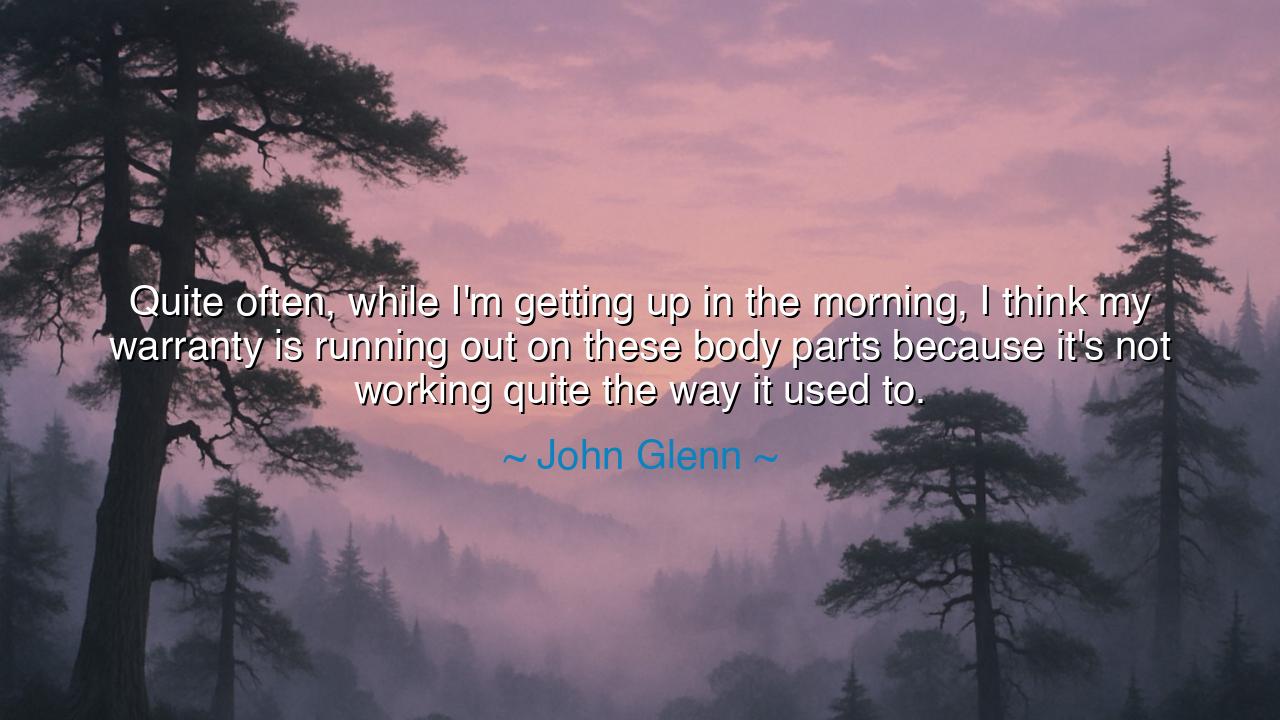
Quite often, while I'm getting up in the morning, I think my
Quite often, while I'm getting up in the morning, I think my warranty is running out on these body parts because it's not working quite the way it used to.






"Quite often, while I'm getting up in the morning, I think my warranty is running out on these body parts because it's not working quite the way it used to." These words from the esteemed John Glenn, a man who journeyed to the heavens and returned with the wisdom of the stars, speak to a universal truth—the inevitable decline of the body. In them, we hear the voice of one who has experienced the limitless possibilities of youth and strength, only to confront the humbling reality that time is a force that even the greatest among us cannot escape. This reflection on aging, on the gradual wearing out of the body, serves as both a reminder and a lesson: that all things, even the mighty, are subject to the laws of nature, and that life’s true challenge lies not in defying time, but in embracing it with grace and wisdom.
John Glenn, a man who flew through the heavens and returned as a hero, understood something that few truly do—that while the body may age, the spirit does not. When he speaks of his warranty running out, he evokes an image of something once new, now fading with use. Yet in this, we are not to see despair, but rather an opportunity to reflect upon the value of what we have, for our bodies, like all things, are temporary vessels. Time works its will upon them, but the soul—the essence of our being—can endure long beyond the limits of flesh and bone. The key lies not in fearing the decline, but in embracing the journey, understanding that even as our bodies wear, the wisdom we gather grows ever richer.
Consider the story of Leonidas, the Spartan king who led his warriors to the gates of death at Thermopylae. Though his body was bound by the same laws of mortality as any other man, his spirit was unyielding, his resolve unbroken. On that fateful day, as he and his warriors stood against the overwhelming Persian army, Leonidas did not lament the aging body that could no longer carry him as it once had. Instead, he embraced the inevitability of his end with the courage of a man who knew that even in death, his legacy would endure. It is in moments like these that we learn the true strength of the human spirit: that what we leave behind, not the state of our body, is what defines us in the end.
So too must we learn from John Glenn’s reflection. As time passes, our bodies may not function as they once did. The youthful vigor that once powered us through the world may fade, and the aches and pains of age may begin to remind us of our limits. But it is in these moments that the true nature of life reveals itself. We are not meant to cling to the illusion of eternal youth, but to embrace the wisdom that comes with age. As the great philosopher Socrates once said, "The unexamined life is not worth living." To live fully is to embrace both the rise and the fall of our journey, to accept that our bodies may age, but our ability to learn, to grow, and to love remains eternal.
Let us now turn to the example of Moses, the ancient leader of the Israelites. Though Moses led his people through the wilderness for forty years, the scriptures tell us that, even in his old age, his eyes were not dim, and his strength was not gone. His body, like all bodies, would eventually fail, but his wisdom remained sharp, and his purpose unyielding. Moses teaches us that it is not the condition of the body, but the strength of will, the fire of the heart, and the clarity of purpose that sustain us. Age, therefore, is not a burden, but a privilege—one that offers us the opportunity to reflect upon our journey, to share our wisdom, and to prepare the next generation to carry forward the lessons we have learned.
The lesson here is clear: Do not fear the passage of time, for it is the natural course of all things. Instead, embrace it with dignity and grace. The body, like all material things, is destined to fade, but the spirit, the essence of who we are, can remain eternal. As we age, we must not focus on what we lose, but on what we gain—the lessons, the experiences, the growth. The body may wear out, but the soul grows stronger. Let each wrinkle, each gray hair, remind you not of loss, but of the richness of a life well-lived, filled with moments that molded you into the person you are today.
And so, let us take practical steps in our own lives to honor the aging process. Cultivate the mind, nourish the spirit, and care for the body with respect, knowing that though it may age, it is the vessel that has carried us through this world. Meditate on the passing of time and the wisdom that comes with it, for the days may be few, but the lessons, if embraced, can last a lifetime. And as John Glenn and so many others before him have shown us, the greatest victory lies not in escaping time, but in embracing it, and in becoming the person who has learned to live fully, no matter the age of the body.






AAdministratorAdministrator
Welcome, honored guests. Please leave a comment, we will respond soon